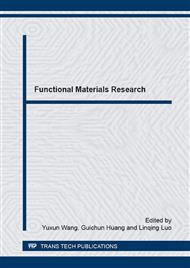[1]
Yan L, Yao S, Chang J F, et al. Pd oxides/hydrous oxides as highly efficient catalyst for formic acid electrooxidation[J]. Journal of Power Sources, 2014, 250: 128-133.
DOI: 10.1016/j.jpowsour.2013.10.085
Google Scholar
[2]
Chang J F, Feng L G, Liu C P, et al. An effective Pd-Ni2P/C anode catalyst for direct formic acid fuel cell [J]. Angew Chem Int Ed, 2014, 53: 122-126.
DOI: 10.1002/anie.201308620
Google Scholar
[3]
Moghaddam R B, Pickup P G. Formic acid oxidation at spontaneously deposited palladium on polyaniline modified carbon fibre paper[J]. Electrochimica Acta, 2011, 56(22): 7666–7672.
DOI: 10.1016/j.electacta.2011.06.066
Google Scholar
[4]
Wadia D, Magdalena H, David D, et al. Redox behaviour of polyaniline–palladium catalytic system in the presence of formic acid[J]. Synthetic Metals, 2010, (23–24): 2546-2551.
DOI: 10.1016/j.synthmet.2010.10.003
Google Scholar
[5]
Kuo C W, Tsai C J, Chen W P , et al. Nano-composite Based on Platinum Particles and Modified Polyaniline for Methanol, Formic Acid, and Ethanol Oxidation[J]. Journal of the Chinese Chemical Society, 2014, 61(7): 819–826.
DOI: 10.1002/jccs.201300634
Google Scholar
[6]
Zhong Q L, Hu L H, Liu Z F, et al. Investigation of electrocatalytic oxidation of formic acid on polyaniline film electrode modified by platinum micropaticles[J]. Fine Chemicals, 2000, 17: 104-106.
Google Scholar
[7]
Prakash G K S, Suresh P, Viva F, et al. Novel single step electrochemical route to γ-MnO2 nanoparticle-coated polyaniline nanofibers: Thermal stability and formic acid oxidation on the resulting nanocomposites[J]. Journal of Power Sources, 2008, 181(1): 79-84.
DOI: 10.1016/j.jpowsour.2008.03.007
Google Scholar
[8]
Podlovchenko B I, Maksimov Y M, Gladysheva T D, et al. Electrocatalytic activity of platinum-polyaniline and palladium-polyaniline systems obtained by cycling the electrode potential [J] . Russian Journal of Electrochemistry, 2000, 36(7): 731-735.
DOI: 10.1007/bf02757672
Google Scholar
[9]
Maksimov Y M, Kolyadko E A, Shishlova A V, et al. Electrocatalytic Behavior of a Palladium–Polyaniline System Obtained by Electrodepositing Palladium into a Preliminarily Formed Polyaniline Film [J]. Russian Journal of Electrochemistry, 2001, 37(8): 777-781.
DOI: 10.1023/a:1016770616304
Google Scholar
[10]
Andreev V N. Electrocatalytic oxidation of formic acid on a glassy-carbon-Nafion- polyaniline-palladium nanoparticle electrode: Effect of the polymer matrix state [J]. Russian Journal of Electrochemistry, 2006, 42(2): 193-196.
DOI: 10.1134/s1023193506020145
Google Scholar
[11]
Del Valle M A, Díaz F R, Bodini M E, et al. Polythiophene, polyaniline and polypyrrole electrodes modified by electrodeposition of Pt and Pt+Pb for formic acid electrooxidation [J]. Journal of Applied Electrochemistry, 1998, 28(9): 943-946.
Google Scholar
[12]
Andreev V N. Electrochemical behavior of single-carbon organic compounds on a composite nafion-polyaniline-palladium particle electrode in acid solutions [J]. Russian Journal of Electrochemistry, 2006, 42(1): 98-101.
DOI: 10.1134/s1023193506010150
Google Scholar
[13]
Zou L, Deng C, Gao Y, et al. Palladium catalysts supported by polyaniline carbon composite for formic acid electrooxidation[J]. Journal of Fuel Chemistry and Technology, 2015, 43(4): 507-512.
Google Scholar
[14]
Liao C, Wei Z D, Chen S G, et al. Synergistic Effect of Polyaniline-Modified Pd/C Catalysts on Formic Acid Oxidation in a Weak Acid Medium (NH4)2SO4[J]. Journal of Physical Chemistry C, 2009, 113 (14): 5705–5710.
DOI: 10.1021/jp8107842
Google Scholar
[15]
Ma X B, Feng Y Y, Li Y, et al. Promoting effect of polyaniline on Pd catalysts for the formic acid electrooxidation reaction. Chinese Journal of Catalysis, 2015, 36: 943–951.
DOI: 10.1016/s1872-2067(15)60863-4
Google Scholar
[16]
Pandey R K, Lakshminarayanan V. Electro-oxidation of formic acid, methanol, and ethanol on electrodeposited Pd-polyaniline nanofiber films in acidic and alkaline medium[J] Journal of Physical Chemistry C, 2009, 113(52): 21596–21603.
DOI: 10.1021/jp908239m
Google Scholar
[17]
Yang Y S, Zhao F, Yin H, et al. Synthesis of one-dimensional polyaniline nanostructures in phosphoric acid and acetic acid system[J]. Journal of northwest normal university, 2015, 51(5): (accepted).
Google Scholar
[18]
Zhang Z M, Wei Z X, Wan M X. Nanostructures of polyaniline doped with inorganic acids [J]. Macromolecules, 2002, 35: 5937–5942.
DOI: 10.1021/ma020199v
Google Scholar
[19]
Huang J, Wan M X. Polyaniline doped with different sulfonic acids by in situ doping polymerization[J]. Journal of Polymer Science, Part A: Polymer Chemistry, 1999, 37(9): 1277–1284.
DOI: 10.1002/(sici)1099-0518(19990501)37:9<1277::aid-pola7>3.0.co;2-a
Google Scholar
[20]
Li Z Y, Yuan Z, Li X N, et al. CO oxidation catalyzed by single-Au atoms supported on aluminum oxide clusters [J]. Journal of American Chemical Society, 2014, 136: 14307-14313.
DOI: 10.1021/ja508547z
Google Scholar
[21]
Meng J H, He S G. Thermal hydrogen activation by a closed-shell AuCeO2+ cluster [J]. Journal Physical Chemical Letter, 2014, 5: 3890-3894.
Google Scholar


